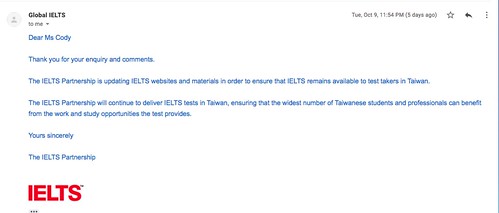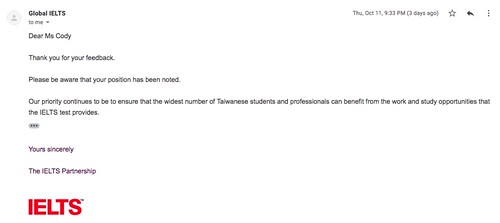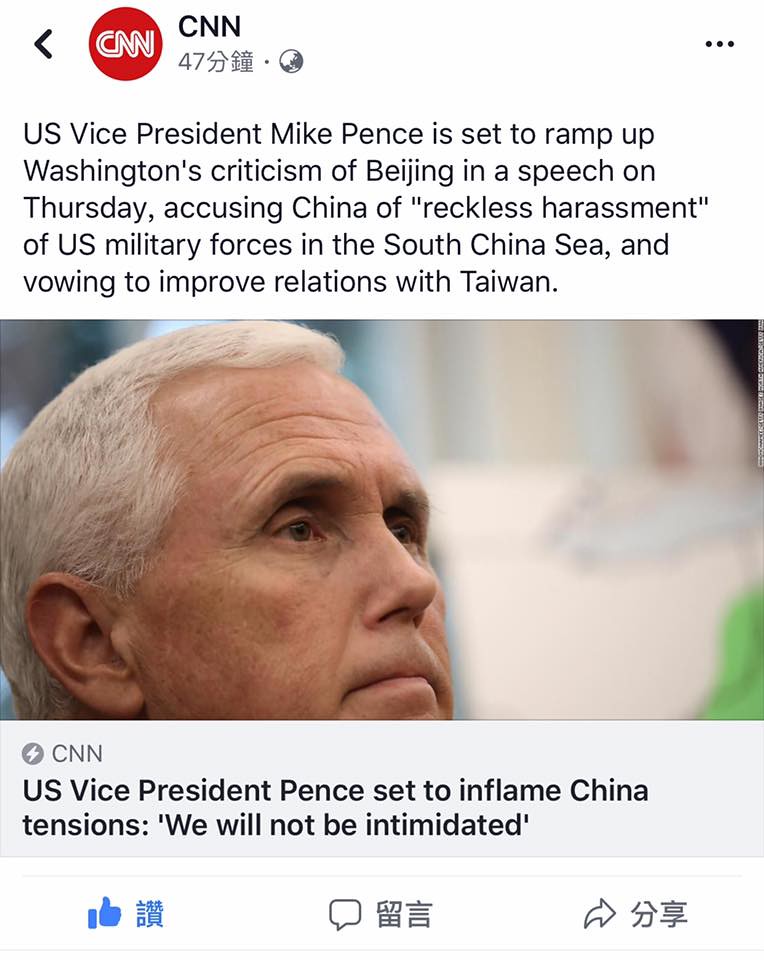So, if you're like and don't have a TV, so can't necessarily watch something when it's on TV, you may be disappointed in the 4 minutes or so of footage across two videos of President Tsai's CNN interview on CNN's official feed.
The good news is that an awesome guy I don't know is here to help! You can watch the full video here.
Apparently two well-known analysts in Taiwan went in on ICRT about the interview (one thinking positively of it, the other negatively), though I haven't listened to the whole thing yet.
I have a few thoughts myself. Tsai herself, in my opinion, performed admirably. To a Western audience - the people this is actually aimed at - she came across as reasonable, pragmatic, even-keeled and intelligent (all things she truly is). She made a very strong case for Taiwan as a beacon of democracy and freedom, and was very clear on the threat from China and why it should matter to the world, without any 'troublemaking' rhetoric. More time could have been spent on marriage equality - as far as I can tell, it wasn't mentioned - though I may have just missed it - to really hammer home the idea of Taiwan as 'liberal beacon in Asia' (it's not that liberal by Western standards but by Asian standards, it kind of is). She also makes a strong case for closer communication and stronger relations with Taiwan, without seeming desperate or begging.
She makes it clear that Taiwan does have its own military capability and can withstand a first wave of attacks. This is essential - we need to show the world that Taiwan does take its defense seriously and would not simply beg the world to defend it as it stood by, helpless and unwilling to stand up for itself.
"If it's Taiwan today, people should ask, 'who's next'?" - I truly don't think one can make a stronger case, and it was delivered succinctly and clearly.
Her point that Taiwan is the only democracy in the Chinese-speaking world, and it produced a female leader, so we need to quit it with thinking women are limited in what they can do is a strong one. By going meta with the 'questions about being a female leader of a country' trope and acknowledging it, with her basically saying 'what I think about such questions don't matter, I have an obligation to answer them until female leaders are totally normalized' (paraphrased), she shows that she always considers her role carefully as a leader rather than giving in to her personal feelings. To Americans who may be sick of seeing the puerile, vengeful, personal spewings of their own president, this is likely to play well.
She showed that she does speak fluent English, but wisely moved back to Mandarin for the more complex questions. This will also play well to a Western audience.
Tsai is quite good at this kind of interview, where she almost certainly prepares careful responses to known topics in advance, and where a questioner prompts her on various topics so she doesn't get too bogged down in technocratic wonkery.
I'll admit that by giving careful answers that kind of evade the meat of the questions asked - on whether Taiwan counts on US support in the face of a Chinese invasion, on whether Trump is an unreliable ally - she does come across as just another 'politician' to some extent. She doesn't really answer these questions, and I would have liked a stronger stance on Taiwanese not favoring unification, now or ever. That said, I think any half-intelligent viewer will understand that her country is in a precarious position. In a situation where a single misplaced word can infuriate China, her 'careful' approach is simply necessary.
All that said, the average Westerner interested enough to watch this interview would, in my estimation, be persuaded that Taiwan is worth taking seriously and its leader is not an 'extremist', an 'ethnic nationalist/separatist' or a hotheaded despot, but the pragmatic, serious, hard-headed and slightly nerdy (okay, very nerdy - that karaoke comment about reading while her friends sang...wow) democratically elected leader of a proud, free society.
That doesn't mean I feel so positive about the whole interview. While I am very pleased with how Tsai presents herself, I'm less of a fan of the historical interludes about the Taiwan-China situation, and some of the language that the interviewer used (namely the terms "reunification" and "mainland").
No one thing the presenter said was wrong, regarding what happened in 1949, the change in diplomatic ties, that Taiwan's official name is the Republic of China, or who the US recognizes as 'the sole China' now and why. No one fact was off-base.
But taken together, it presents an image of Taiwanese history that I can't endorse as accurate: there are several lies of omission that seem like minor details but are in fact pivotal to an accurate telling of Taiwan's story. If included, such details would change the overall narrative of Taiwanese history to such a great degree that leaving them out feels false.
Imagine if, instead of the usual "1949", "two Chinas", "the Republic of China still claims" narrative without any key details, the presenter had said something like this:
"Taiwan had been a Japanese colony until the end of World War II, when the Allied Powers allowed the Republic of China to accept Japan's surrender on their behalf and govern Taiwan, amid some controversy. The Nationalists and their leader, Chiang Kai-shek, who controlled Republic of China, were then defeated by the Communists under Mao Zedong, who founded the People's Republic of China. The Nationalists fled to Taiwan, claiming to be the 'sole' government of the 'true' China. Both leaders of these "two Chinas" were military dictatorships marked by oppression and mass murder. The United States recognized the Republic of China on Taiwan, under Chiang Kai-shek, until the late 1970s, when it switched recognition to the PRC in Beijing. Since then, China has continued on a trajectory of dictatorship while Taiwan has democratized and liberalized, with many Taiwanese no longer identifying as 'Chinese'. Polls in Taiwan show consistent support for a separate Taiwanese national and cultural identity. Some in Washington say that in light of this, it's time to re-assess US policy in the region, which..."
Same basic facts, but with pertinent details centered in the narrative, it tells quite a different story, doesn't it?
But, hey.
We can't get everything we want, so I can only hope that during the 'historical' interludes, American viewers went to the kitchen to get more chips.
In the end, it doesn't matter as much as Tsai comporting herself well, which she clearly did. Taiwan needs to present a clear case to the world that it is worth taking seriously and aiding if necessary. I never thought I'd say Tsai Ing-wen was the public speaker who could accomplish much of anything (she's not a great speaker), but...I could be wrong. She's exactly the face Taiwan needs to show to the West.
Showing posts with label international_discourse. Show all posts
Showing posts with label international_discourse. Show all posts
Monday, February 25, 2019
Sunday, February 17, 2019
Where Richard Bush is right, and where he is wrong
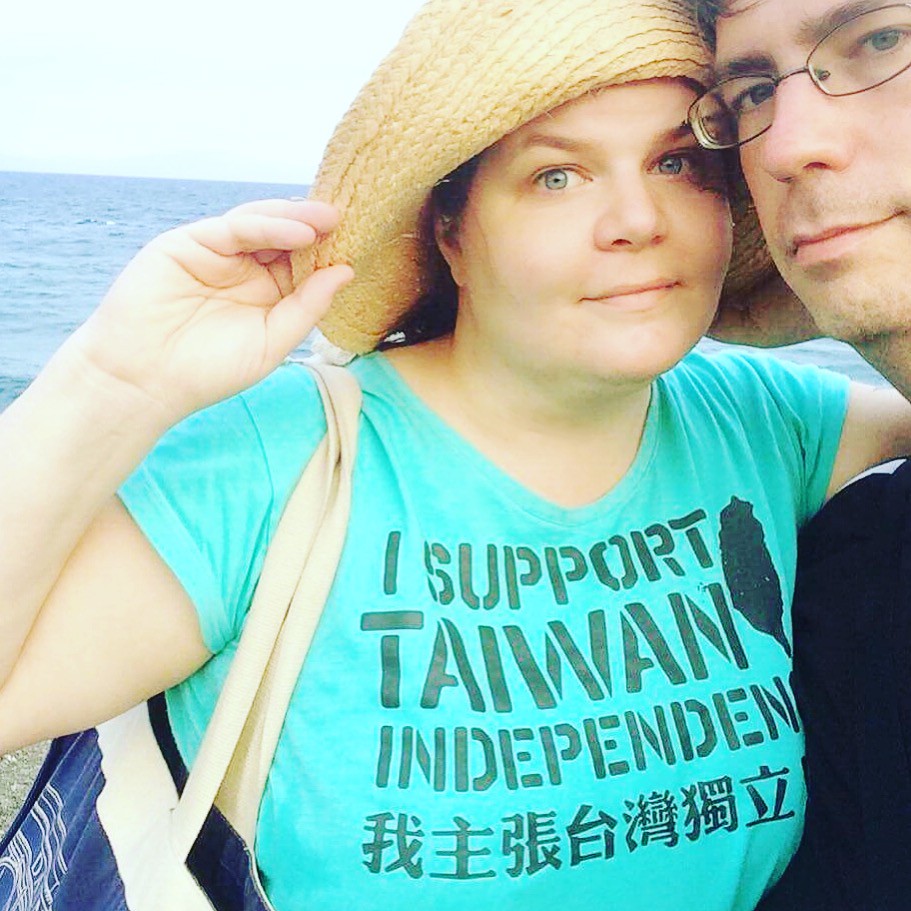
Let me start out by saying that I don't think China expert (which somehow includes Taiwan? I mean, being the former AIT chair makes that okay, but they are not the same thing) Richard Bush is a Confucius McDoorknob. We can all agree that he is deeply credible.
So, let me be kind, and start with the ways that his two most recent articles (here and here) are right, before talking about the ways that they aren't.
In the first article, he's quite right that Tsai has been doing an excellent job of managing cross-strait relations, using caution most of the time, but snapping back like a bad-ass she-wolf at the appropriate times. This is just right, and Bush and the US are right to support her:
In my view, one of the reasons that the United States has expressed support for President Tsai and her administration is precisely because she is cautious and careful. She does not take the U.S. commitment for granted and understands the value of close communication.
He's also right that a referendum on de jure Taiwanese independence is a terrible idea.
Frozen Garlic covered why referendums are not the direct-democracy saviors their supporters make them out to be in the context of energy policy; it really covers referendums as a problematic tool more generally, though, and I highly suggest reading it.
Echoing Froze, Bush points out:
When it comes to democratic mechanisms, none is perfect in my view. Whether it is indirect democracy in a legislature or direct democracy through a referendum, distortion and manipulation of the popular will occurs. So a referendum is not necessarily better than other mechanisms.
If referendums are to be employed on routine policy issues, in my view, they should be crafted in a way so the result truly reflects the view of the majority of all citizens. I’m not sure one can say that about the referendums that were held on November 24 last year.
All the more so when the referendum is on questions regarding the fundamental identity of a state and a nation. For these, it is a good thing to set a high bar for authorizing a referendum and passing a referendum. The stakes are so high and the consequences of being wrong are so great, that it is appropriate—even mandatory—to require a broad public consensus through a super-majority for passage. Witness the trouble that Great Britain is now in because only a simple majority of those voting for Brexit was required for passage.
There are other reasons why it's a bad move, as well: first, that it would take a willfully blind person or someone invested in an outcome they are not openly articulating to say that Tsai is not working toward setting the fundamentals in motion for eventual de jure independence. It's not even reasonable to say she's moving too slowly; this is the pace you have to move at when you are threatened by a nasty bully just a few hundred miles away with missiles pointed at you.
It doesn't take a genius to understand that Taiwan has to make choices based in its real situation, not in how it would like the world to be right now.
The only reasonable criticism, then, is that she's not doing a particularly good job of 'selling' her way of doing things to the public. I do understand this is difficult: the deep blues already think this is the GREEN TERROR (it's not, and that phrase doesn't mean anything) and the deep greens are in fantasyland - they'd rather do what feels good than work in concrete ways toward a future for Taiwan. But it does feel as though she hasn't really tried.
So to say that what's needed is a bing-bam-boom REFERENDUM! goes beyond wishful thinking - in some ways it's straight-up childish.
And, of course, it's a bad move because it will probably fail. I mean, look at how easily the tide turned on the referendum to end the use of "Chinese Taipei" (which realistically would have meant applying to stop using that name - there's no way it would have been accepted). All it took was the IOC being a bunch of whiny buttclowns and the Taiwanese Olympic athletes coming out against the change to get the Taiwanese not to vote for a referendum that would have symbolically told the world that they think "Chinese Taipei" is a preposterous name, which it objectively is.
If we can't even pass "what the hell is Chinese Taipei?", how are we going to pass this? We're not. That doesn't mean the Taiwanese electorate doesn't generally support independence; most people do.
And, as much as I hate to admit it, he's right about Taiwan having to take into account the political situation in the US and what they will and will not realistically offer Taiwan.
Yeah I know I just puked in my mouth saying that too, but it doesn't make it untrue.
From the "open letter":
I do not know how firm the Trump administration’s commitment to Taiwan’s defense would be if military conflict were likely. There are certainly those who see Taiwan as a useful asset in its campaign to resist what they regard as China’s revisionist objectives. But valuing Taiwan’s partnership in this way is not the same thing as giving Taiwan, or political forces in Taiwan, a green light to act unilaterally to change the status quo, a principle that remains a central element of U.S. policy.
I do know that President Trump himself is skeptical about any U.S. security commitment to Taiwan. At a meeting of the National Security Council on January 19, 2018, Mr. Trump asked his senior national security team, “even more than [Korea], what do we get from protecting Taiwan?” The implication of that question is the U.S. commitment to Taiwan is not justified, as far as he is concerned. I have seen no evidence that this skepticism has changed. It is consistent with his long-standing opposition to U.S. defense commitments to U.S. friends and allies.
and from the "let's not invite Tsai to speak" article, which I think was easily the worse of the two:
Make no mistake: The United States should continuously find ways to improve relations with Taiwan. We need to improve our economic relationship and help Taiwan effectively enhance its deterrence against China. That requires engaging Taiwan leaders on how they realistically believe American can help them, not how we think we should help. Forty years of American experience in conducting U.S.-China relations has demonstrated the need to be skillful and sometimes stealthy in our Taiwan diplomacy. Public symbols, deftly deployed, are important in relations with Taiwan, but substance is far more important.
In short, when talking about how to improve the chances of a truly independent future for Taiwan, it is simply smart to consider the US position as Taiwan's most powerful potential ally. I don't like it any more than you do, but whether or not the US will ultimately stand up for Taiwan does matter. At the very least it forces Taiwan to consider what it has at its own disposal when making decisions rather than assuming that its underdog status is so sympathetic and its cause so just (though it is) that of course anyone who truly cares about a free and democratic world will, in the end, stand by us. But that is not at all assured. It's not right and it's not fair, but it is sadly true.
And, of course, he was smart to point out that the call to invite Tsai to address Congress originated with a group of US Senators, and it's not clear that Tsai herself thinks its a good idea:
The third flaw in this initiative is its disregard for Taiwan’s view. I’m guessing here, but I suspect that the authors did not ask President Tsai if she thought this was a good idea—and, if they did ask, they didn’t listen very carefully to her answer. President Tsai is responsible for the prosperity and safety of 23 million people. She understands that she must maintain some degree of balance between relations with the United States on the one hand and relations with China on the other. Clearly, relations with China are not as good as she might like them to be, but I believe she would not wish to risk a further, serious deterioration in relations with Beijing unless it brought it an extraordinary benefit.
But I have to say, there are a lot of ways in which Bush is straight-up dead-ass what-the-hell wrong.
Starting with the quote above, what's up with the fallacy that Tsai can do much, if anything, about deteriorating relations with Beijing. They're going to treat Taiwan like garbage no matter what she does because they simply don't like her, the DPP, or the Taiwan consensus. Relations are deteriorating because Beijing is deteriorating them, and that's not going to change.
Along these lines, and alongside some pretty solid wisdom, Bush is also selling some Grade A snake oil. Reading these articles is like going to your Harvard-educated doctor who effectively treats an infection with modern medicine, and then recommends you get your humors balanced.
Let's start with the top shelf dippery:
The first aspect is that the proposal touches on the national interests of the United States, specifically its abiding interest in peace and security in the Taiwan area and its longstanding view that neither side of the Taiwan Strait should try unilaterally to change the status quo.
and:
You will recall that President Bush publicly criticized Mr. Chen in December 2003 for trying to unilaterally change the status quo. In September 2007, then-Deputy Assistant Secretary of State Thomas Christensen warned that Mr. Chen was putting Taiwan’s security at stake for the sake of the DPP’s electoral advantage.
These points pre-suppose that the status quo can potentially be changed bilaterally, or in some way other than unilaterally (and that the DPP fights the status quo "for its electoral advantage" rather than because they, and most Taiwanese, actually believe in working toward an independent Taiwan).
This is false.
It's not only false, it's dangerous to buy into. It will never happen. There's no game to play here, no potential winning strategy in which, if Taiwan negotiates with China in just the right way, or plays nice to just the right CCP officials, that there will be a breakthrough and a permanent situation of peace and Taiwan's assured autonomy would tumble from the heavens, rejoice!
China. Will. NEVER. Agree. To. A. Bilateral. Solution. That. Taiwan. Can. Accept.
Ever.
Well, unless the CCP falls in an inglorious revolution, but that would create so much instability and uncertainty (a dying CCP who invades Taiwan as a last-ditch effort to distract its own people from the situation about to boil over at home?) that it's not exactly desirable either. Slow reforms and so-called "bloodless" democratization/liberalization are even less likely, at least not on any timeline that will be viable.
That leaves three possible solutions that Bush is assiduously trying to avoid admitting to:
a.) war
b.) perpetual status quo
c.) some non-war-starting way of unilaterally changing the status quo
(The idea of peaceful unification is as much a non-starter as China agreeing bilaterally to Taiwanese independence: Taiwan would never accept it).
War is possible, but quite wisely, nobody (except perhaps China) wants to pursue it, so let's leave it aside. The perpetual status quo is a chimaera. It seems real enough but can't last. There's just no way that Taiwan's current situation is permanently tenable. This is because while the CCP as a whole may not be in any great rush to try to annex Taiwan, Xi Jinping harps on it in a way reminiscent of Chiang Kai-shek before anyone took him seriously. It seems unlikely to me that he'll run China for the rest of his life without at least making an attempt to accomplish it. And yet, the Taiwanese overwhelmingly support independence (whether de facto or de jure). They may vote for politicians who say otherwise, for other reasons, but when those politicians make concrete moves towards integrating with China, watch how their fortunes change.
So what does that leave us? Option C. I have no idea how we cause that to come about, but seeing as I don't see any "bilateral" way of changing anything between Taiwan and China, we can't take any potential future unilateral action off the table.
That Bush wants to imply that this is not Taiwan's reality, and that a bilateral solution may be possible, is dangerous wishful thinking at best, and straight-up snake oil served by gaslight at worst.
And, while I appreciate that Taiwan must take the US's position into consideration, I balk at the implication that we should prioritize the US-China relationship as though it is somehow more important to Taiwan than the question of its own continued sovereignty:
If the president of Taiwan were to speak to a joint meeting of Congress, any U.S. claim that its relations with Taiwan were unofficial would ring completely hollow. China would interpret the move as Washington’s reneging on the fundamental bargain at the heart of U.S.-PRC relations. Although I cannot predict exactly what Beijing would do in response, a radical downgrading of the relationship would be likely. Any hope that President Trump would have of cutting a trade deal with his New Best Friend Xi Jinping would vanish. U.S. requests for Chinese assistance concerning North Korea would fall on very deaf ears. Many sectors of American society that still value the U.S.-China relationship would be hurt. American multinationals that rely on China as a market or production platform would be vulnerable to retaliation, with attendant effects on jobs and profits.
Yeah okay but now you're starting to make it sound as though US corporate profits are Taiwan's chief concern, or that we should be worried about the US-China relationship for its own sake, beyond what it portends for the US-Taiwan relationship (or the Taiwan-China relationship).
We don't. I don't care about a trade deal between the US and China beyond its potential impact on Taiwan, and I don't care about the "fundamental bargain at the heart of US-China relations" because it's a crap bargain. I want US to normalize and make official relations with Taiwan, so why would any Taiwan-prioritizing readers take this paragraph seriously?
I mean, I get it, this is aimed as much at a US political audience as a Taiwan one, but as someone who prioritizes Taiwan, it is deeply unconvincing. Poor babies. It might hurt your profits. Oh noes. Oh wait, I don't care.
Finally, I'll also say that this simply can't be argued with, but is still deeply problematic for reasons explained below:
Also, neither you nor I can control how the Beijing government interprets developments on Taiwan and whether they trigger Article 8 of the Anti-Secession Law.
What bothers me about it is that he comes so close to understanding a deeper truth about China: that they are going to treat Taiwan like crap no matter what, and Taiwan can't control that (the US, in theory, could influence it in some way - if it wanted to. It doesn't.)
But no, he stops there, and then promptly trots out the same old blather implying that Taiwan not only can, but should, play this game with China:
The second flaw in this proposal [for Tsai to address Congress] is Taiwan would suffer. This initiative began in the United States, and Beijing would take the opportunity to pressure and squeeze Taiwan even more than it is already doing. It would likely find ways to get the small number of countries that still maintain diplomatic relations with Taipei to switch to the PRC. Taiwan-directed exercises by China’s People’s Liberation Army would intensify. China’s efforts to interfere in Taiwan’s domestic politics would increase. So, a gesture that senators intended to help Taiwan would only hurt it.
Taiwan is going to "suffer" no matter what. China will "squeeze" Taiwan no matter what. They will try to poach our (well, the ROC's) diplomatic allies no matter what (and I'm not sure how much I care - it's not like those countries recognize Taiwan. They recognize the ROC as China, which is not the same thing really). Taiwan-directed exercises by the PLA will probably intensify no matter what, and Xi's anti-Taiwan rhetoric will escalate no matter what. So while I admire Bush's genuine concern for Taiwan, he's coming at it in not only a wrong, but condescending way - as though we don't see for ourselves that China is already doing the things he is threatening China will do.
Let me repeat:
China is going to increasingly treat Taiwan like garbage no matter what Taiwan does, and there is nothing acceptable to the Taiwanese electorate that Taiwan can do to stop it.
So if the CCP is going to continue to be a bunch of glass-hearted pissbabies, and they are going to increase their bullying of Taiwan regardless, then dude.
Let them.
And don't buy into the illusory nonsense that if Taiwan just plays footsie in the right way, it can negotiate a better outcome for itself or somehow convince China to stop being such a jag-off. This will never happen.
The only way to win this game is not to play. I support Tsai because, while it looks like she's playing China's game, she in fact has her own deck of cards and is playing her own long hand. China's not even invited to the poker table.
So let's keep not playing. Let's not make any rash moves, and let's stop tearing ourselves apart because some people need to prove that they are more ideologically "pure" rather than seeking realistic, practical solutions that lay the groundwork for a future that includes an independent Taiwan.
But holy mother of god, let's not buy any "but China will be mad and you can't make any unilateral changes!" garbage.
We know better and we will not be fooled.
Wednesday, January 2, 2019
Xi Jinping is probably a terrible parent, given the way he treats Taiwan
Another day, another repetition of China's old line that if Taiwan would just agree to unify with China, that their rights would be assured under the "one country two systems" framework.
The article is strong, and includes analysis from experts who mostly actually seem to know what they are talking about. It avoids the incorrect use of "reunification", which not many reports on the issue do. It's clear that a.) Taiwanese are not likely to ever embrace unification (meaning that if it ever happens, it will be annexation, not unification); b.) things aren't great in Hong Kong; and c.) that Taiwan has "everything to lose and nothing to gain" from unification with China.
There are a few flaws, such as not dissecting Jeanne-Pierre Cabestan's assertion that Beijing's offered "reward" is "sweeter" than previous offers when in fact it's just the same old crap, and using the phrase "tensions could rise" rather than clearly identifying China as the source of tensions. But, it's good work overall and I don't want to dwell on these small nitpicks.
Instead, seeing as Xi Dada routinely treats Taiwan as a recalcitrant child (Taiwan is not China's child, but this is how he sees it), I have to wonder what kind of Dad he is exactly. Does he treat his own kid this way?
I can only imagine that conversations in the Xi household go something like this:
Xi Dada: "Honey, come give your Dad a foot rub."
Formosa: "Ew. No. That's gross, you're gross, your feet smell and I'm not going to do it."
Xi Dada: "Come on, don't you want to give me a foot rub?"
Formosa: "I literally just said I don't want to do that."
Xi Dada: "If you give me a foot rub, I'll let you take out the garbage!"
Formosa: "Um, I don't want to take out the garbage or rub your feet. I especially don't want to rub your feet so that I can take out the garbage."
Xi Dada: "Oh, honey, but...if you give me a foot rub, you can take out the garbage! Won't that be great?"
Formosa: "Did you not hear me say two seconds ago that I don't want to take out the garbage?"
Xi Jinping: "If you take out the garbage, you can take out your own garbage with my garbage."
Formosa: "I only have a little garbage. I can take it out myself. You have a ton of garbage. I would be totally buried in it. That's disgusting and I said no."
Xi Jinping: "But honey...don't you want to take out the garbage? You can do that if you rub my feet!"
Formosa: "For the last fucking time, I don't want to give you a foot rub, and I don't want to take out the garbage, so why would I agree to give you a foot rub so I can do another thing I don't want to do?"
Xi Jinping: "Why are you so difficult? This is a wound on our family! It's a matter of family pride that we all agree on."
Formosa: "I don't agree with that and never really said I did."
Xi Jinping: "You used to say that!"
Formosa: "Back when I was forced to. Now I'm not. I never actually believed it and you know that. To be frank, I'm not even sure you're my real Dad."
Xi Jinping: "But I'm offering you so much! I keep sweetening the deal and you keep turning me down!"
Formosa: "What makes it sweeter?"
Xi Jinping: "If you give me a footrub, you can...take out...the...garbage!"
Formosa: "That's not sweeter, that's the same thing you offered me before and it's terrible."
Xi Jinping: "Your cousin gave me a foot rub and took out the garbage and he loves it!"
Formosa: "No he doesn't! You forced him to give you a foot rub and take out the garbage and now he smells like your feet and is covered in garbage!"
Xi Jinping: "That's not true."
Cousin Hong Kong: "That's true."
Xi Jinping: "This is a wound to our family pride!"
International Media: "Oh no! Tensions could...be risen...in the China household!"
Formosa: "Um, I just live nearby and I don't know why this jackass says he's my 'Dad', so - - "
International Media: "Shhh!"
Xi Dada: "A WOUND ON OUR FAMILY PRIDE!! We as a family can never be truly happy until Formosa rubs my feet and gets her reward of taking out the garbage! That's what everyone wants!"
Formosa: "No, it's not what anyone but you - - oh whatever. I'm not going to do it but I'm done telling you why."
The article is strong, and includes analysis from experts who mostly actually seem to know what they are talking about. It avoids the incorrect use of "reunification", which not many reports on the issue do. It's clear that a.) Taiwanese are not likely to ever embrace unification (meaning that if it ever happens, it will be annexation, not unification); b.) things aren't great in Hong Kong; and c.) that Taiwan has "everything to lose and nothing to gain" from unification with China.
There are a few flaws, such as not dissecting Jeanne-Pierre Cabestan's assertion that Beijing's offered "reward" is "sweeter" than previous offers when in fact it's just the same old crap, and using the phrase "tensions could rise" rather than clearly identifying China as the source of tensions. But, it's good work overall and I don't want to dwell on these small nitpicks.
Instead, seeing as Xi Dada routinely treats Taiwan as a recalcitrant child (Taiwan is not China's child, but this is how he sees it), I have to wonder what kind of Dad he is exactly. Does he treat his own kid this way?
I can only imagine that conversations in the Xi household go something like this:
Xi Dada: "Honey, come give your Dad a foot rub."
Formosa: "Ew. No. That's gross, you're gross, your feet smell and I'm not going to do it."
Xi Dada: "Come on, don't you want to give me a foot rub?"
Formosa: "I literally just said I don't want to do that."
Xi Dada: "If you give me a foot rub, I'll let you take out the garbage!"
Formosa: "Um, I don't want to take out the garbage or rub your feet. I especially don't want to rub your feet so that I can take out the garbage."
Xi Dada: "Oh, honey, but...if you give me a foot rub, you can take out the garbage! Won't that be great?"
Formosa: "Did you not hear me say two seconds ago that I don't want to take out the garbage?"
Xi Jinping: "If you take out the garbage, you can take out your own garbage with my garbage."
Formosa: "I only have a little garbage. I can take it out myself. You have a ton of garbage. I would be totally buried in it. That's disgusting and I said no."
Xi Jinping: "But honey...don't you want to take out the garbage? You can do that if you rub my feet!"
Formosa: "For the last fucking time, I don't want to give you a foot rub, and I don't want to take out the garbage, so why would I agree to give you a foot rub so I can do another thing I don't want to do?"
Xi Jinping: "Why are you so difficult? This is a wound on our family! It's a matter of family pride that we all agree on."
Formosa: "I don't agree with that and never really said I did."
Xi Jinping: "You used to say that!"
Formosa: "Back when I was forced to. Now I'm not. I never actually believed it and you know that. To be frank, I'm not even sure you're my real Dad."
Xi Jinping: "But I'm offering you so much! I keep sweetening the deal and you keep turning me down!"
Formosa: "What makes it sweeter?"
Xi Jinping: "If you give me a footrub, you can...take out...the...garbage!"
Formosa: "That's not sweeter, that's the same thing you offered me before and it's terrible."
Xi Jinping: "Your cousin gave me a foot rub and took out the garbage and he loves it!"
Formosa: "No he doesn't! You forced him to give you a foot rub and take out the garbage and now he smells like your feet and is covered in garbage!"
Xi Jinping: "That's not true."
Cousin Hong Kong: "That's true."
Xi Jinping: "This is a wound to our family pride!"
International Media: "Oh no! Tensions could...be risen...in the China household!"
Formosa: "Um, I just live nearby and I don't know why this jackass says he's my 'Dad', so - - "
International Media: "Shhh!"
Xi Dada: "A WOUND ON OUR FAMILY PRIDE!! We as a family can never be truly happy until Formosa rubs my feet and gets her reward of taking out the garbage! That's what everyone wants!"
Formosa: "No, it's not what anyone but you - - oh whatever. I'm not going to do it but I'm done telling you why."
Tuesday, October 23, 2018
This Week in CHINA TENSIONS!!!!
Apparently the old way of avoiding saying that China creates tensions through its own aggressive expansionism and weaponized use of 'hurt feelings' (and century-out-of-date victimhood - more on that later) isn't harvesting as many clicks as it used to. Perhaps passive voice (those tensions - they were just...raised!) isn't thirsty enough, perhaps simply attributing these tensions to everyone but China wasn't interesting anymore.
Now, we need BIGGER and STRONGER verbs to THROTTLE readers' attention because REPORTING THE SITUATION ACCURATELY is apparently not enough.
The accurate situation: China is engaging in territorial expansionism using fabricated historical narratives to justify it. The "tensions" over Taiwan are created by China, and are a policy choice on the part of China. They are not - as someone on my twitter feed put it - a "natural reaction" to what others do. China does not suffer because the US sent warships through the Taiwan Strait. The strait is considered international waters (and this has been pointed out before). Nothing changes in China when a country sends a warship through international waters.
If anything, China is the one creating the situation where a response is necessary. If China hadn't been slowly pushing the envelope towards a world where it controlled Taiwan and the Taiwan Strait as well, the US wouldn't have felt it necessary to demonstrate that it had the right to sail ships in all international waters.
That means that China is not only choosing to respond to this with "OMG that means tensions!" but in fact that they created the tensions to begin with.
If the media reported that accurately, here is what these completely ridiculous headlines and tweets would actually look like:
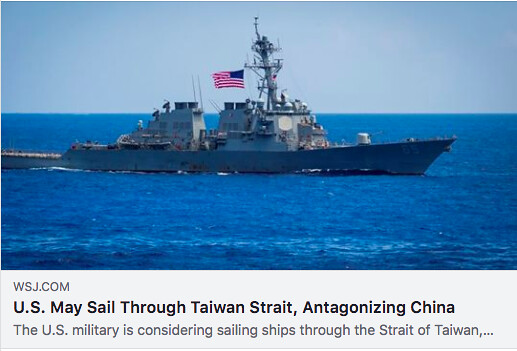
Ooh, a new one - "antagonize"! I guess simply "causing tensions" wasn't eye-catching enough.
But it should be:
"US May Sail Through Taiwan Strait In Response To Chinese Antagonism In Region"
(This was later changed to "provoking", which isn't much better.)
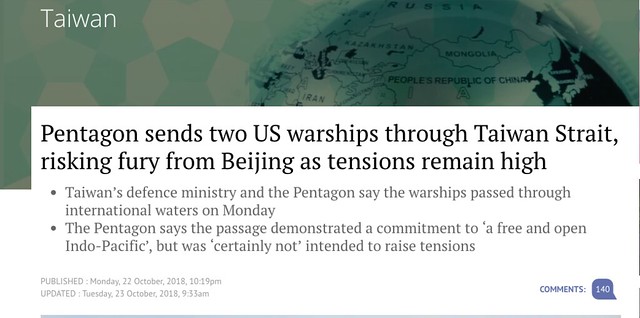
Wow, fury! Really? Actual fury? What has China got to be "furious" about when another country sails ships in international waters, unless it is choosing to be furious?
Nope, let me fix that for you:
"Chinese aggression against Taiwan risks U.S. fury, Pentagon sends two warships into nearby international waters"
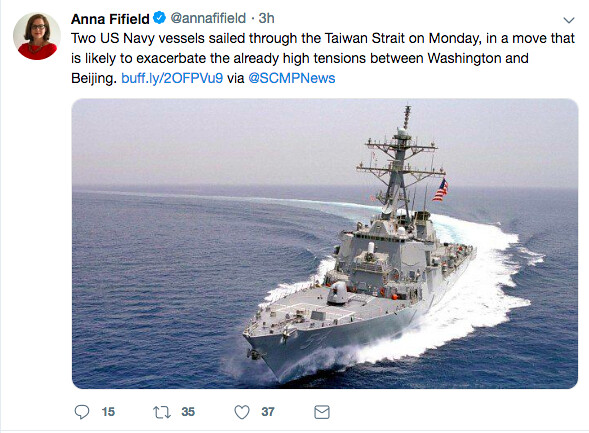
EXACERBATE! Hah.
I'm especially saddened by this tweet, because the Beijing bureau chief of the Washington Post should understand the region better than this. Anyway, her tweet would more accurately read:
"Two US Navy vessels sailed through the Taiwan Strait on Monday, in a move that warns China against further exacerbating tensions with Taiwan"
Let me add - "already high tensions" - where did these tensions come from? Who created them? In whose interest is it for those tensions to remain high? Who keeps getting angry?
You know the answer is "China", so why does your tweet imply that the U.S. is to blame?
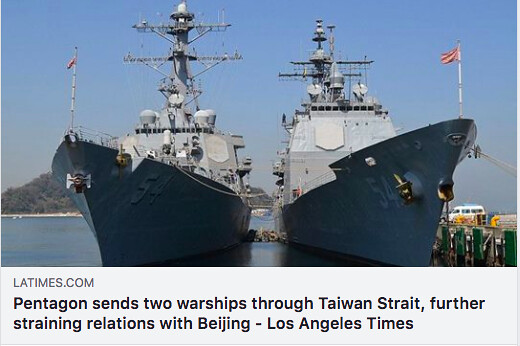
Oh man. LA Times finally got someone other than Ralph "I hate Taiwan" Jennings to write about Taiwan, and they still come out with this garbage. What's even more annoying is that the most salient quote is in the article itself:
“The ships’ transit though the Taiwan Strait demonstrates the U.S. commitment to a free and open Indo-Pacific,” said Lt. Rachel McMarr, a spokeswoman for the U.S. Pacific Fleet. “The U.S. Navy will continue to fly, sail and operate anywhere international law allows.”
So, if you have to report on this at all (which you don't), maybe try:
"Pentagon sends two warships through Taiwan Strait as warning to Beijing to cease raising tensions"
or even:
"Why is China angry about the Pentagon sending two warships through international waters?"
And your laugh of the day:
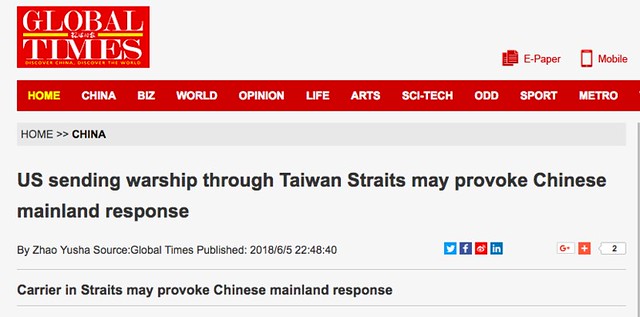
China provoked a US response, not the other way around. But this is Global Times, who cares. But let's play anyway:
"China's actions in Taiwan Straits [sic] provoke US response of sending warship through international waters"
* * *
This worries me, because I fear the way these things are being reported won't change. Newly-minted journalists will feel they have to stick to the old lines to get published and won't insist on accurate wording, editors will continue to edit pieces on topics they know nothing about, and actual bureau chiefs (jesus) will EXACERBATE the problem by sharing news that makes it seem as though this situation is everyone's fault but China's.
They know better: like with Chinese "tensions", it's a choice to publish headlines this obtuse and backwards.
It also worries me because China will absolutely continue to use this to their advantage, and nobody will say anything. Then the US will respond to China's actions. Or Taiwan will. And everyone will jump on that, pointing fingers at the U.S. and Taiwan and saying "these guys are exacerbating tensions!"
It makes it impossible to respond to China, when China's own actions are not held up to the same standard. When they are not objectively considered.
Again, this is a choice. They know better. They are helping an authoritarian regime look like a victim, and therefore helping them expand not only their territorial claims but their attempts to export authoritarianism. They are aware of this. Yet they continue to do it.
And, finally, it worries me because China is taking its cues from nobler causes in the West. It's looking at how we legitimately talk about historical victimization and how that affects modern society (think: arguments about inheriting tangible and intangible generational wealth vs. inheriting trauma while still being discriminated against).
It's taking that - a real, legitimate argument - and twisting it around to weaponize its own "century of humiliation". It is the most powerful actor in Asia, has taken by force most of the territory it says it wants (which is mostly full of people with distinct cultural backgrounds who don't want to be ruled by China), and is an economic powerhouse.
In whatever ways China was victimized in the past - and it certainly was - its claim on Taiwan is not an extension of that. Not historically, not culturally, not legally. The government that rules China now has never ruled Taiwan, and if we're going to talk "antiquity", has only in recent history even considered that Taiwan could possibly be Chinese.
Let me say that again for the people in the back: even if a historical argument supported China's claims on Taiwan, which it doesn't, it wouldn't matter. Taiwan has a culture, sense of history and identity that differs from China now, and they do not want to be a part of China ever. China doesn't get to have an opinion on the future of a territory it does not hold, and which its current government (with its current borders) has never held.
China can whine and cry and play victim, but the fact that it does not have Taiwan is not a facet of its historical victimhood. And even if it were, there is no just world in which the lives of 23.4 million people are an acceptable form of reparations.
And yet all of these headlines about 'antagonizing', 'exacerbating' and 'provoking' China make it sound as though it is. As though China is still being bullied like it's the Opium Wars or something. As though it isn't the one upping the ante, with Taiwan and the U.S. responding.
This is the best possible headline, by the way:
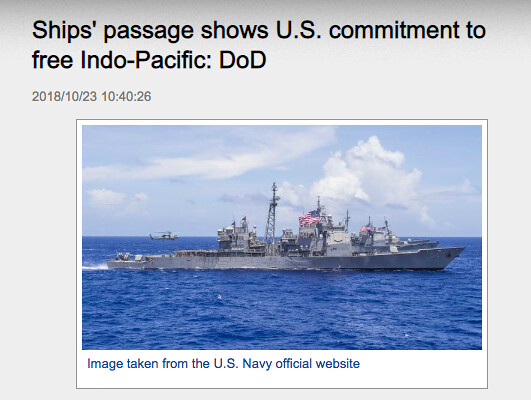
It's from Focus Taiwan so will obviously show Taiwan's point of view, but that happens to also be the accurate point of view in this case, even incorporating a quote from a U.S. military spokesperson.
You know this, journos, yet you report all that other garbage anyway.
Seriously. Quit it.
Now, we need BIGGER and STRONGER verbs to THROTTLE readers' attention because REPORTING THE SITUATION ACCURATELY is apparently not enough.
The accurate situation: China is engaging in territorial expansionism using fabricated historical narratives to justify it. The "tensions" over Taiwan are created by China, and are a policy choice on the part of China. They are not - as someone on my twitter feed put it - a "natural reaction" to what others do. China does not suffer because the US sent warships through the Taiwan Strait. The strait is considered international waters (and this has been pointed out before). Nothing changes in China when a country sends a warship through international waters.
If anything, China is the one creating the situation where a response is necessary. If China hadn't been slowly pushing the envelope towards a world where it controlled Taiwan and the Taiwan Strait as well, the US wouldn't have felt it necessary to demonstrate that it had the right to sail ships in all international waters.
That means that China is not only choosing to respond to this with "OMG that means tensions!" but in fact that they created the tensions to begin with.
If the media reported that accurately, here is what these completely ridiculous headlines and tweets would actually look like:

Ooh, a new one - "antagonize"! I guess simply "causing tensions" wasn't eye-catching enough.
But it should be:
"US May Sail Through Taiwan Strait In Response To Chinese Antagonism In Region"
(This was later changed to "provoking", which isn't much better.)

Wow, fury! Really? Actual fury? What has China got to be "furious" about when another country sails ships in international waters, unless it is choosing to be furious?
Nope, let me fix that for you:
"Chinese aggression against Taiwan risks U.S. fury, Pentagon sends two warships into nearby international waters"

EXACERBATE! Hah.
I'm especially saddened by this tweet, because the Beijing bureau chief of the Washington Post should understand the region better than this. Anyway, her tweet would more accurately read:
"Two US Navy vessels sailed through the Taiwan Strait on Monday, in a move that warns China against further exacerbating tensions with Taiwan"
Let me add - "already high tensions" - where did these tensions come from? Who created them? In whose interest is it for those tensions to remain high? Who keeps getting angry?
You know the answer is "China", so why does your tweet imply that the U.S. is to blame?

Oh man. LA Times finally got someone other than Ralph "I hate Taiwan" Jennings to write about Taiwan, and they still come out with this garbage. What's even more annoying is that the most salient quote is in the article itself:
“The ships’ transit though the Taiwan Strait demonstrates the U.S. commitment to a free and open Indo-Pacific,” said Lt. Rachel McMarr, a spokeswoman for the U.S. Pacific Fleet. “The U.S. Navy will continue to fly, sail and operate anywhere international law allows.”
So, if you have to report on this at all (which you don't), maybe try:
"Pentagon sends two warships through Taiwan Strait as warning to Beijing to cease raising tensions"
or even:
"Why is China angry about the Pentagon sending two warships through international waters?"
And your laugh of the day:

China provoked a US response, not the other way around. But this is Global Times, who cares. But let's play anyway:
"China's actions in Taiwan Straits [sic] provoke US response of sending warship through international waters"
* * *
This worries me, because I fear the way these things are being reported won't change. Newly-minted journalists will feel they have to stick to the old lines to get published and won't insist on accurate wording, editors will continue to edit pieces on topics they know nothing about, and actual bureau chiefs (jesus) will EXACERBATE the problem by sharing news that makes it seem as though this situation is everyone's fault but China's.
They know better: like with Chinese "tensions", it's a choice to publish headlines this obtuse and backwards.
It also worries me because China will absolutely continue to use this to their advantage, and nobody will say anything. Then the US will respond to China's actions. Or Taiwan will. And everyone will jump on that, pointing fingers at the U.S. and Taiwan and saying "these guys are exacerbating tensions!"
It makes it impossible to respond to China, when China's own actions are not held up to the same standard. When they are not objectively considered.
Again, this is a choice. They know better. They are helping an authoritarian regime look like a victim, and therefore helping them expand not only their territorial claims but their attempts to export authoritarianism. They are aware of this. Yet they continue to do it.
And, finally, it worries me because China is taking its cues from nobler causes in the West. It's looking at how we legitimately talk about historical victimization and how that affects modern society (think: arguments about inheriting tangible and intangible generational wealth vs. inheriting trauma while still being discriminated against).
It's taking that - a real, legitimate argument - and twisting it around to weaponize its own "century of humiliation". It is the most powerful actor in Asia, has taken by force most of the territory it says it wants (which is mostly full of people with distinct cultural backgrounds who don't want to be ruled by China), and is an economic powerhouse.
In whatever ways China was victimized in the past - and it certainly was - its claim on Taiwan is not an extension of that. Not historically, not culturally, not legally. The government that rules China now has never ruled Taiwan, and if we're going to talk "antiquity", has only in recent history even considered that Taiwan could possibly be Chinese.
Let me say that again for the people in the back: even if a historical argument supported China's claims on Taiwan, which it doesn't, it wouldn't matter. Taiwan has a culture, sense of history and identity that differs from China now, and they do not want to be a part of China ever. China doesn't get to have an opinion on the future of a territory it does not hold, and which its current government (with its current borders) has never held.
China can whine and cry and play victim, but the fact that it does not have Taiwan is not a facet of its historical victimhood. And even if it were, there is no just world in which the lives of 23.4 million people are an acceptable form of reparations.
And yet all of these headlines about 'antagonizing', 'exacerbating' and 'provoking' China make it sound as though it is. As though China is still being bullied like it's the Opium Wars or something. As though it isn't the one upping the ante, with Taiwan and the U.S. responding.
This is the best possible headline, by the way:

It's from Focus Taiwan so will obviously show Taiwan's point of view, but that happens to also be the accurate point of view in this case, even incorporating a quote from a U.S. military spokesperson.
You know this, journos, yet you report all that other garbage anyway.
Seriously. Quit it.
Saturday, October 20, 2018
Why is everyone so upset that Ko said Taiwan is a "product on a shelf"?
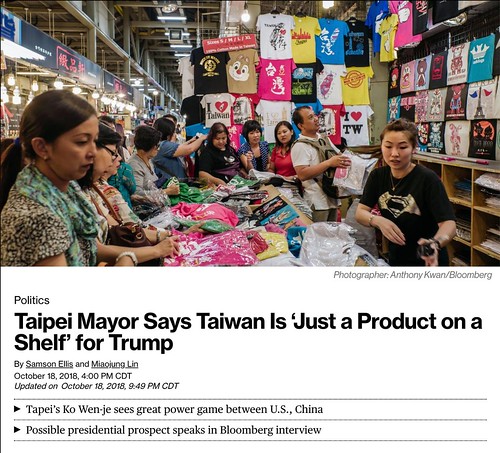 |
| The screenshot that launched a million words |
Because I'm gonna say it: he's right.
Taiwan must focus on making itself more valuable to President Donald Trump and accept its status as a pawn in the great power game between the U.S. and China, Taipei Mayor Ko Wen-je said.
Nobody likes to hear that they "must accept their status as a pawn" - but that doesn't make it untrue. We absolutely should not overestimate the US's willingness to defend Taiwan.
And he's not only right about Donald Trump, who is absolutely not a reliable ally to anyone and sees everything as an opportunity that can bolster his own self-image or worth or a threat to be eradicated (or at least shouted at incoherently), he's also right about the US in general. Not only that, it's been true for awhile.
This doesn't mean Taiwan shouldn't deal with the US, or should refuse its help, but that's not what Ko said: he said we needed a strategy to deal with this reality. That's just a correct statement.
But it seemed as though nobody wanted to hear it. What struck me was the swiftness and absolute horror of the reaction from Taiwanese activists, commentators, friends and other people involved in the struggle for a better Taiwan. The general feeling seemed to be, essentially "how could he say such a thing?"
I was a bit curious about that so I asked around, paid attention to various comment threads (like this one) on the topic, and generally just tried to get a sense of what was so terrible about essentially making an accurate, if damning, statement about the US's commitment to Taiwan.
The main point of anger doesn't seem to be the idea that Taiwan is a "pawn", but that the Ko has not equally addressed the fact that if Taiwan is a poker chip to the US, then it's also one to China. Essentially, he's speaking out about how the US sees Taiwan, but is seen by the public as worryingly - and oddly - growing closer to China.
There's a sense among many Taiwanese that Ko has questionable motives, from using China's language on two sides of the strait being "one family" to gaining Chinese state television endorsements to rumors that China is encouraging Taishang (Taiwanese businesspeople in China) to return to vote for Ko and is supporting him for a 2020 presidential run on the assumption that the KMT can't win, with Ko himself not doing much to dispel these notions. I've even heard rumors about some deeply weird cross-party alliances that...well, I won't even go there.
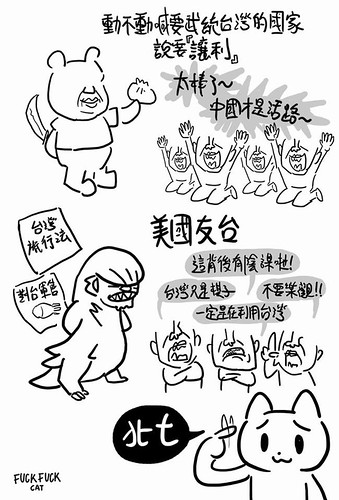 |
| From 幹幹貓: probably one of the most common things I read to improve my colloquial Chinese. It's all in Mandarin but you should check it out! |
There's also the general sentiment - captured in the Fuck Fuck Cat cartoon above - that so many Taiwanese voters and politicians are willing to bend over for China at a few sweet words promising economic incentives, ignoring China's stated and obvious intentions. These (often same) people will blast the US-Taiwan relationship as something they can't trust, despite all sorts of actually good things the US has done, from the Taiwan Travel Act to arms sales, without anything close to the ill intent of China.
So it makes sense from their perspective to worry that he'd be so dismissive of Taiwan as a commodity of the US, but silent on how China views Taiwan.
I get that too - here he basically says there is no such thing as "cross-strait relations": one could charitably parse that as "China is a foreign country like any other", but I can see how someone might hear it as "cross-strait relations don't exist because we're all the same" given some of his language choices in the past.
He goes on, however, to basically speak truth to power: saying that Trump has repeated "America First!" ad nauseam, and it's foolish to not believe him. When one reporter said "but some are insisting that you really shouldn't say 'Taiwan is just a product'", he replied, basically, "I dunno, what else am I supposed to say?"
Which...yeah.
I'm sure there are people under Trump who care about Taiwan as more than a 'product', and they've had enough say in the US's recent Taiwan policy that we've seen some real benefits. But an entire book could be written on how past administrations have seen Taiwan as a poker chip - from Bush speaking out against Taiwan independence in 2003 to Obama "selling so few arms to Taiwan that he came close to violating the Taiwan Relations Act", as a friend once put it.
The Bloomberg piece that created this poopfest goes on to say:
The outspoken former surgeon and potential presidential contender told Bloomberg News that Taiwan shouldn’t overestimate the U.S.’s willingness to defend the island from an attack by its much bigger neighbor. Ko, 59, said Taiwan needed to boost its worth to America by strengthening shared values, such as democracy and economic transparency (emphasis mine).
Again, yeah. What reasonable person would argue with that?
I could argue that playing up values like 'shared democracy' wouldn't matter - the US has a history of ignoring human rights abuses, or responding flaccidly to them, when economic benefits might be at stake (including the US's response to Tiananmen Square after 1989). That doesn't mean we shouldn't make this a selling point for Taiwan, however.
But, this is apparently not good enough: there are all sorts of rumors about his having a role in organ harvesting (getting discounts on organs from China? Something like that. I'm not too clear), on the nature of his previous visits to China and other things I won't bother with.
I'm not saying I believe all of this - I'm just pointing out that this is what is being said.
Some of the above are clearly election season character-smearing trash or at best should be taken with a Tainan Salt Museum mountain of salt, yet a lot of the comments I've been seeing slamming Ko for calling Taiwan a "product on the shelf" for the US reference the above rumors as though they are fact, and therefore prove that Ko wants to move away from a stronger relationship with the US and towards a friendlier one with China. Of course, they prove no such thing.
I don't know. I see their point vis-a-vis China - I too have been disappointed with Ko's rhetoric in this area (though much more worried about his only serious opponent's even stronger pro-China talking points). I find it odd that he'd be so quick to abandon the base that voted him in, of not-quite-DPP pro-Taiwan voters and Sunflower-energized youth to start talking like a weird old unificationist, and yet, I remain agnostic on the notion that he actually is a unificationist. I also remain agnostic on the idea that he has some deep-level "four-dimensional chess" strategy going on to deal with China: the evidence doesn't support that, either.
And I've been deeply disappointed with some in the Taiwanese electorate who are willing to believe any and all claptrap from China, who really is our enemy, and then are so quick to turn around and criticize the US.
Anyway, I get it. We big-noses are talking about how Ko is "telling it like it is" because we're just thinking about his comments vis-a-vis the US, without looking at how they stack up to his comments about China. Removed from that context, we're right. Put back in context, however, I see why this angers a certain subset of Taiwanese.
Finally, there's a sentiment among some as well that Ko supporters are becoming overly rabid themselves - acting like extremists or fundamentalists, balking at the slightest criticism (I've seen this in action, by the way - it is, in some cases, a thing). Among Ko supporters, there's a sentiment that everyone knows the guy speaks bluntly and undiplomatically, and we all say we want politicians who say what they mean, so are you really going to crucify him every time he does exactly that?
And yet, I can't repeat it enough: when you strip all that away and look at US-Taiwan relations specifically, and ignore the rumors dogging Ko in other areas, you have to admit: he's absolutely right. Trump keeps repeating "America First" - and when people tell you who they are, believe them.
Tuesday, October 16, 2018
IELTS takes a political position (and my ongoing battle to fight The Man)
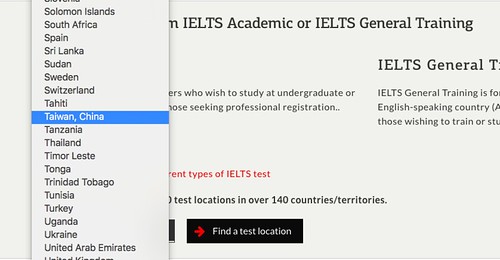 |
| Jerks. |
As my husband noted in his nail-on-the-head post on the same topic, pretty much every IELTS teacher and examiner we know is horrified by the change on IELTS's website of "Taiwan" to "Taiwan, China" (Notably, Hong Kong and Macau bear no such designation. If I didn't already know this was all about politics, I'd say that's odd).
Many of us have written to IELTS to protest the change, including me. I'd include a screenshot, except that e-mail contains references to the nature of my employment which I cannot divulge, but which when blacked out render the letter incoherent. Suffice it to say, it was an angry but basically formal letter of protest and complaint.
We all got the same completely irrelevant form letters in reply, which didn't actually address the issue we wrote about:
You can write to them too, by the way, their email is globalielts@ielts.org. See if you get the same bogus form letter! It'll be a fun international discourse comparison!
Of course, I wrote back to point out that their form letter reply was irrelevant to the protest lodged and got a snottier, though I suppose more relevant, reply:
This is where I got a little testy. I'd say "I have a short temper", but several days on I decided to send this anyway. It won't make a difference, so please enjoy it as a retort created for your entertainment:
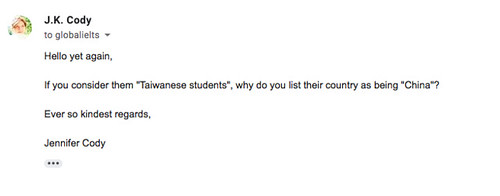 |
| "If you consider them 'Taiwanese students', why do you list their country as being 'China'?" |
Here's the thing. I know perfectly well that we're probably not going to win this, because The Man doesn't care about our tinny complaints. It pretends to be apolitical while taking a political, pro-Beijing position. And that is what you're doing when you list Taiwan as "Taiwan, China": you are taking a political position. You are saying Taiwan is a part of China, a position most Taiwanese do not agree with.
It's hard to fight the power, which as a friend pointed out, is the entire point of having power - so it's harder for people to fight you. IELTS pretends to be a dispassionate language proficiency test, but it's also a source of power: are you a non-native speaker who wants to study in the UK (or other countries) or get certain kinds of visas? You have to take it. It's tied to the government through British Council and the UKVI service. That's power. It's not just a test.
It wants to think it's not The Man, but it absolutely is. And as The Man almost always is, IELTS is wrong.
For me, this is the point at which "Taiwan, China" stops being an abstraction: it's not just an unfair, stupid thing that terrible companies do for money. It affects me personally: I'm associated with the brand. Some of my income comes from them. If I refuse to accept this, there is a real impact on my life, moreso than boycotting airlines or slagging off TOEFL. I don't earn money from those companies. I don't know how I can take dirty money now, so for the first time in a very long time, I'm faced with a choice between a chunk of my income, and my principles.
As China expands its forcefulness, more people like me will start facing that choice. I have to hope enough of them will choose principles, as I'm headed towards doing, but I know that many won't.
This isn't a small issue relegated to Taiwan and China. It affects people like me. It affects international workers and foreign residents.
And, as Brendan pointed out in his excellent post (which you should absolutely read), IELTS is essentially helping China accomplish its political goals, which serve as precursors to its military goals:
The government of the PRC would like nothing more than to take over Taiwan and incorporate it into their territory....This is not the ranting of a conspiracy monger -- China isn’t even trying to hide its intentions.
Whether China takes Taiwan by force or by “peaceful” coercion, it doesn’t want the rest of the world to see it as a larger country taking over a smaller, less powerful country. That would look very bad. Instead, China wants the rest of the world to see Taiwan as a recalcitrant part of China that needs to be brought to heel. That’s why (among many things) it’s got people pushing to change “Taiwan” on those drop-down menus to things like “Taiwan, China” or “Taiwan, Province of China”. It’s all about changing the world’s perception of Taiwan so that if Invasion Day comes, the rest of the world doesn’t see Xi Jinping as another Hitler invading Poland.
And every airline that lists Taiwan as China and every educational institution that forces students to declare their country as “Taiwan, China” is complicit in this. With Beijing -- not politically neutral.
I don't know how to fight that. I don't know how to tell you to fight that. I'm still weighing my options, although I know that not acting is not an option. I don't know what to tell my students, except not to take IELTS.
I know some Taiwan-based examiners read this blog. I know a lot of Taiwanese do, too. I don't know what to tell you.
I considered suggesting a strike, and still think that might be a possibility. I worry, however, that it will hurt local centers like IDP Taipei, who are not our enemies (I suspect a lot of the local employees of IELTS centers are on our side, in fact) without really hurting IELTS as a global organization. It might be our best shot, however, at getting this story to stay in the news and embarrass IELTS as much as possible.
I considered a petition, but TOEFL ignored the one directed at them, and IELTS will too. That's what The Man does - he ignores petitions, because he has power.
I considered saying you should change your scripts and say explicitly that Taiwan is NOT CHINA, but that could hurt candidates' performance and that's not fair. It's not their fault (even with the Chinese candidates, it's not their fault at all that their government sucks).
Of course I will continue to encourage Taiwanese students not to take the test.
Something more should be done, but the result has to hurt IELTS Global. What should that something be? I don't know yet. But I have no intention of going away and I have no intention of quietly choosing money over principles.
All I can say is that I encourage you to organize (and feel free to get in touch with me, by the way. I'm easy to find). Be creative, and don't back down. The Man usually wins, but that doesn't mean you have to sit down and obey meekly.
I wish I had better advice, though. I'm not sure what the next move will be, but I can assure you we're not done here.
Sunday, October 7, 2018
How is it that "China tensions" are always everybody's fault except China's?
Over the past few months, I've been keeping quiet track of something that's been a problem for awhile, because it's important to always keep a fire burning under the bum of anyone who reports on Taiwan.
Perhaps, with Michael Turton no longer blogging, someone's gotta do it. Perhaps I'm just fed up. I don't know. But in any case, it's once again time to look at the English-language media on Taiwan and their completely mangled ways of referencing "tensions" (OMG!) in the Taiwan Strait.
Let's get one thing out of the way - the tensions, such as they are, are always there. China wants you to think they're going up and down, but in fact when looking at it from Taiwan, nothing has really changed. My life is the same as it was on Election Day 2016. China attempts to chip away at Taiwan in little ways, but the "tensions" don't really change much beyond that.
But if you keep writing that they are "on the rise" or that "relations" keep hitting new "lows", people will think there's a real change. There isn't.
Notice the above - China is the one being aggressively expansionist in the South China Sea. China is the one that regularly threatens Taiwan with eventual annexation, actively tries to interfere in Taiwanese affairs, and attempts to diminish Taiwan's exposure and standing on the international stage.
Yet who is "inflaming" tensions? Not China - the US! For standing up to them! China can bully its neighbors in the region all it wants - if you dare stand up to that bully, you are the one "inflaming".
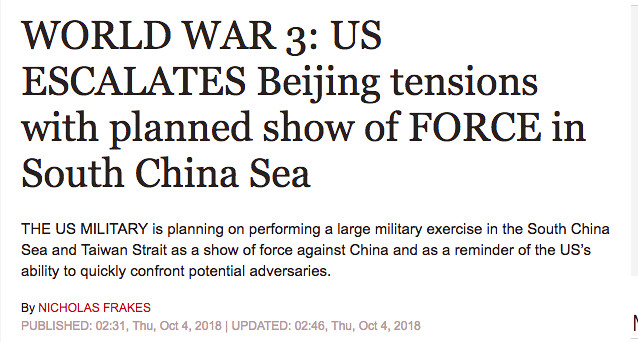
I mean, this is in Express so don't take it too seriously, but not only does the US "inflame" tensions, it "escalates" them. At least it's not Taiwan creating "tensions" anymore, it's the US. Is that an improvement? I don't think so: it plays right into a lot of anti-West liberals' beliefs that everything Western is evil and everything Asian is great, and that evil empires can only come from the West. Therefore, if the power is non-Western, it must be better or more moral.
This is absolute bollocks of course, but a lot of people believe it, and headlines like this don't help.
ALSO DON'T FORGET THE COMPLETELY GRATUITOUS AND UNPROFESSIONAL CAPITALIZATION.
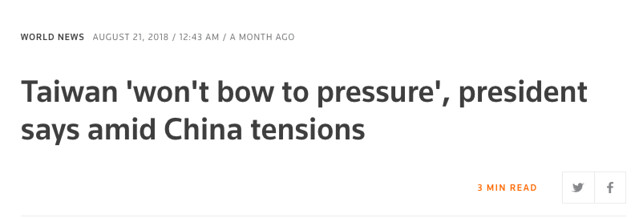
I call this the "Classic" - in this construction, tensions just appear. Nobody causes them. Nobody is the aggressor (or at least, the aggressor is definitely not China). It's left unclear, because to clarify it would be to say, clearly and accurately, that China is the one purposely causing "tensions", and encouraging those tensions to be reported in the press as either an issue that just is - and therefore could not possibly be solved by the CCP being slightly less churlish because these tensions sort of exist ambiently - or is somehow Taiwan's or someone else's fault. They do this in order to make Taiwan's every move difficult.
That's an accurate reading of China's strategy of "tensions", yet nobody seems to report it that way. Nobody assigns the proper agent.
Here are some more ambient "tensions" for you:
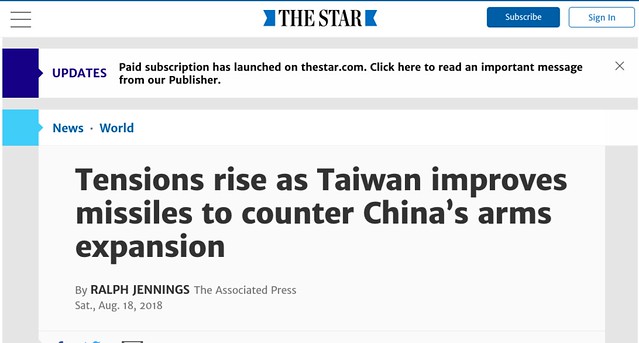
Oh great, Taiwan's biggest human boondoggle in journalism writing about tensions as though they rise independently, rather than someone (China) making them rise, and implying that the reason is Taiwan's actions of mere self-defense, rather than China's aggression (which necessitates that self-defense).
Tensions are like self-rising flour I guess. They just...rise.
If you think I'm being to harsh, read an excerpt below:

I'm not sure how to read that last sentence, but it sure comes across to me as an implication that Taiwan maintaining its ability to defend itself from a Chinese attack - because remember, Taiwan has no intention of attacking Taiwan, but China absolutely talks of its intent to attack Taiwan - is what is "raising the chances of an armed conflict".
Not, oh, say, the country that actually talks about how it plans to precipitate an armed conflict.
China can talk openly about its intent to start a war to annex Taiwan by force, and nobody will say it is "raising tensions", but when Taiwan tries to improve its ability to defend itself from that openly-admitted-to attack, it is "raising the chances of an armed conflict".
And finally, there's the one that makes me sad:

I'd really hoped for better from The Guardian. I've written about this before, so won't belabor the point, but it's worth briefly repeating that this toes a line that, on either side, is not fair. Either it can be read as "relations reaching a low" with no agent pushing them to that low (although there is an agent: China), or it can be read as Tsai and her party (which "advocates for independence") being the ones who are causing the relation to "reach a low".
The opposite is true: Tsai has done her best to be even-tempered and toe a peaceful line while not giving in to China's bullying (a wise policy maneuver that is often mischaracterized as her refusing to "make concessions" to China - as though the problem were her stance, not China's, and she should be the one to concede). Yet you won't reach that conclusion by reading this.
The headline of this one was a problem too, making it sound as though Taiwan's isolation had no agent causing it, when the truth is that China is the one working to isolate Taiwan.
That is the accurate way to report the situation - China as the principal agent, the bully, the tension-causer, the isolator - so how come nobody says so?
Anyway, let's end on a happier note:

This is from the Washington Post - good work. Finally, someone gets it right. Someone assigns the proper agent to the "feud", the "relations hitting a low", the "tensions" - someone finally points the finger right where it belongs: China.
It's a message that the West desperately needs to hear. Why couldn't CNN, The Star and The Guardian write like this? (Express gonna Express, whatever.)
The Washington Post getting it right notwithstanding, this feels like another season, another batch of "tensions" that nobody will admit China is causing.
I'll check back in around the New Year to see who is writing about these sentient, self-raising "tensions" that are always on the rise despite, in reality, their always being about the same.
Wednesday, October 3, 2018
The left finally notices Taiwan - super late to the game
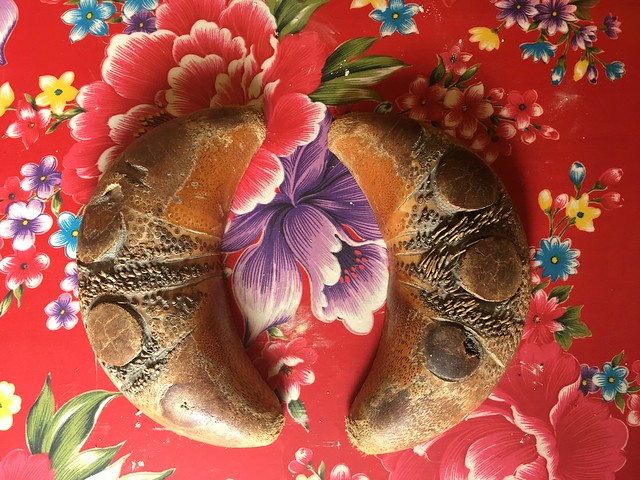 |
| Come on, give Taiwan a chance. |
A truly excellent piece of writing and overall backgrounder on Taiwan and why the Western left should care about it appeared in Dissent Magazine recently.
I'm elated. I have nothing bad to say about the piece. My only disappointment is that not enough mainstream Western lefties read Dissent, and its online access is blocked by a paywall (frankly, the reason for the former is certainly, in part, the latter). So a lot of people who should read this piece, won't.
Because you probably don't have access to read the full article, and I do (don't ask how, but I have my sorceress ways), I'm basically going to quote relevant bits here without going full-on copyright infringement, and hope that this will make the ideas therein a bit more accessible to those who so desperately need to hear them.
Here's how it starts:
Imagine a small, peaceful, progressive island in Asia about the size of Mary- land. Ruled until the Cold War’s very end by a military dictatorship, it is now a robust democracy, although it endures incessant hostility from its giant neighbor. Its people treasure their hard-fought equality, free press, and vibrant civil society.
The rest of the introduction is free to read, so I'll be taking the rest from the parts that are not accessible to non-subscribers. In any case, this is the country I call home. And, with some exceptions, it basically lives up to this promise as well as any democratic nation can.
Boasting the world’s largest standing army and an expansionist outlook, the People’s Republic of China deems Taiwan a “renegade province” that must be “reunified” in due course. And because the Chinese claim the island as part of their territory, they go out of their way to block its international participation. Essentially, they have made befriending Taiwan a zero-sum game for anyone who dares to do so, and the rules are simple: Engage with us and we will reward you; engage with them and we will punish you. It is fierce dollar diplomacy Beijing insists on waging, and Taipei can’t win.
Exactly, and thank you to this writer for putting "renegade province" and "reunified" in the scare quotes they always needed. Why can't mainstream media outlets do that? It's simple, easy and more accurate than what they do print (which is similar copy without the quotation marks, implying the claims have merit.) That the West doesn't see the game China is playing here, or doesn't care and is willing to sacrifice 23.5 million people who currently live free is terrifying to me. If you say you have values, live up to them, damn it.
In a recent poll that asked whether unification is an option if China democratizes (itself a long shot), just 24 percent of respondents aged thirty-nine or below said yes, while 73 percent said no. Since 2009, according to another survey, a majority of the island’s population has consistently self-identified as taiwanese— not as Chinese, nor as both—a sign that they have long assumed their de facto independence.
Yup. This idea that "both sides of the Strait" think of themselves or identify as "Chinese" is basically complete trash-in-the-dumpster bollocks. It's not true and hasn't been true for some time. Why the rest of the world is willing to force an identity on Taiwan - "but they're officially the Republic of China so they think they are Chinese too!", which is an oversimplification that leads to a dead-wrong conclusion - is beyond me. Everyone else gets to identify as they wish with liberal support - why not Taiwanese?
Keep in mind that Taiwan cannot change its official name from the Republic of China because doing so would precipitate a war that nobody wants, especially not the Taiwanese who, above all else, want peace. It wasn't a country name chosen by the Taiwanese - it was decided by the Nationalist government in China, without ever asking any Taiwanese what they thought about it. In essence, it is colonial. So it's a bit of a jerk's game of Catch-22 to then say this attempt to maintain peace means they "are Chinese".
As a diverse, tolerant country with a leader who has shattered the ultimate glass ceiling for Asian women, there is every reason to expect that tai- wan’s most faithful allies in the U.S. are on the left. Except that is not the case at all: American progressives tend to view it as either a reactionary state or one of no importance.
I think I need to change my pants.
This is so true it hurts, and what is worse, it's so painfully wrong. It calls to mind, forcefully, a "conversation" (more like an ignorant rant-fest on his part that I very much wanted to end) between a friend-of-a-friend on social media, in which he went on and on (and on and on), basically Dunning-Krugering himself into a tizzy about how it would be "better" and we should "hope" that Taiwan takes over China, because apparently this worked in Hong Kong (I don't think he's ever asked any Hong Kongers what they think about that, or read about how that's actually gone down, because that's not the answer I think many would give) and anyway, they're the same people with the same culture and history, so why not?
That 23.5 million people don't think they are the same people with the same culture and history, and who have already built the sort of democracy with a healthy respect for civil society that Western liberals can only wet dream about (just try occupying Congress in the United States - you'd be dead), didn't seem to factor in.
John Bolton, who would later become Trump’s national security advisor, electrified conservatives when he declared on Fox & Friends: “Nobody in Beijing gets to dictate who we talk to.”
But then came the partisan backlash. It just so perfectly fit the anti- trump narrative: a buffoon elected president who was already, before taking office, eroding well-established “norms” because he was either too reckless or too ignorant. “that’s how wars start,” tweeted Senator Chris Murphy. trump’s “flippant calls” were “threatening to create diplomatic crises,” Vanity Fair asserted in the same article that compared tsai with other controversial world leaders with whom trump had also spoken, like Rodrigo Duterte of the Philippines and Nursultan Nazarbayev of Kazakhstan, as if she, too, was a notorious human rights abuser.
Somebody please get me a towel, because it's getting hot in here.
Anyway, yeah, all this. Tsai is a moderate - if anything, too careful and too conservative - democratically-elected leader. Like all elected leaders, she is imperfect, but damn, she ain't Duterte. Likewise, Taiwan's democracy is imperfect. Some people who ought to be protected, aren't. But it ain't Turkey.
This echoes what the rest of the world writes about Taiwan and China - as though Tsai were somehow the one "causing tensions", or her fairly mild "we won't take any crap from China but we won't make waves either" stance (exactly the right attitude to take when facing a bully) was some sort of "hardliner" rant.
But since Horrible Death Walrus John Bolton said it - despite the fact that this one (and only) time, he was right - the left flipped the hell out.
And I thought our side was better at evaluating the merit of the idea rather than dismissing it based on its source. Hmm. Maybe we're not as smart as I thought.
Absent from the mainstream media discourse were the views of ordinary taiwanese, most of whom do not remotely share trump’s politics but were delighted to learn of their country’s long overdue acceptance and validation on the international stage. One commentator called it “the happiest thing” for Taiwan since the Jimmy Carter years.
HOO BOY HOSE ME DOWN.
Seriously, we have been trying to tell the West this for years. Why is it that the views of China and the CCP are always given center stage in the media and general pundit commentariat, and nobody ever seems to ask what the Taiwanese think about all this?
The article goes on to reflect on some of the ideas of this piece, which you should also read.
So, as late as the waning days of 1986, this was the scenario Washington faced: neither side could accept coexistence as they each claimed to be the sole, rightful owner of China and Taiwan combined. to keep gambling on Beijing—which first began with Richard Nixon’s famous visit in 1972 and formalized when Carter severed diplomatic ties in 1979 with Taipei—seemed sensible enough.
It was not at all imaginable that Taiwan would be the one to emerge as Asia’s beacon of freedom so soon while China would backslide.
Exactly. In 1979 the Western reaction to Taiwan made more sense - Taiwan was still a dictatorship, ruled by people not from Taiwan, who never asked the Taiwan if they wanted to be ruled. You know, like a colony.
And yeah, that dictatorship (which, again, was not Taiwanese) claimed to be the sole legitimate government of China. That sucks, but it's not Taiwan's fault and certainly doesn't reflect the views of the Taiwanese today. These guys did not even come from Taiwan and their dictatorship is over (though the party still, unfortunately, exists).
The idea that the legitimate government of China is currently in Taiwan is ludicrous, and almost all Taiwanese would agree with this. Those that don't tend to be in their 90s and were not born in Taiwan. And sure, maybe it's too bad that Grandpa lost the war, but things have changed.
So why doesn't the West get this too? Because, like, hey libs. It's not 1979 anymore. The king is dead! Long live the democratically elected leader of one of the freest countries in Asia!
There's a bit more history there, but I'm getting a little quote-happy. Just be aware that it was the 90s, and the first George Bush's actions after Tiananmen Square, that led to neo-conservatives taking up the cause of Taiwan (called the "Blue Team" - though Taiwan isn't exactly 'blue' anymore, it was then). Of course, what neo-cons champion, those liberals - well, the ones who don't think or don't know better - reflexively hate. Cue Clinton's tepid views on Taiwan, which set the stage for a general liberal ignoring of a quickly democratizing and liberalizing nation.
Some more recent history for you:
Simultaneously in Washington, the Blue team became ever more influential with Congress, think tanks, and even the incoming president’s inner circle. But while George W. Bush and his neoconservative allies were keen to confront Beijing early in his first term, they soon found themselves need- ing crucial Chinese cooperation in North Korea and especially the Middle East after 9/11; this compelled Bush to speak out against taiwanese independence in December 2003. the “One China” policy hence survived as a cornerstone of American foreign policy. Obama’s “pivot to Asia” did not alter that either, as he kept Taiwan out of the Trans-Pacific Partnership negotiations, although the free-trade pact was itself designed to counterbalance China’s regional clout.
You may hate the TPP, but if its more noble goals were ever achievable, it was just stupid to leave Taiwan out. A sign of liberal shortsightedness.
Today in Ttrump’s America, the staunchest supporters of Taiwan have been the same band of Republican hawks, from heavyweights such as Bob Dole and the late John McCain to Senators Marco Rubio and Ted Cruz, who are descendants of the Blue team. Because of this interconnection, the issue continues to be perceived as a right-wing cause with which progressives are reluctant to be associated.
Weeeeeelllll...here's where I begin to disagree. Pro-Taiwan lobbying groups and associations talk to Republicans and Lizard People like Ted Cruz because they have power now, and they'll take whatever help they can get (you may not like that, but it is a pragmatic approach. Yeah, it makes my skin crawl too. I know.)
But pro-Taiwan bills have recently had unanimous support, and Taiwan generally does have bipartisan support. As for why the left doesn't speak out for Taiwan as much as the right, I have no idea. I suspect it's because they're not as smart as they think they are, and as smart as I always wanted them to be that they don't see a natural ally in Asia staring them right in the face. A shame. Taiwan is super hawt and needn't be the nerdy virgin in this story, hoping to get the guy.
The rejection of Chiang’s memory reflects an undeniable reality: the old assumption that both Taiwan and China long to unite as one nation-state but disagree on which regime has legitimacy is simply not accurate any- more. Beijing’s failure to uphold the promise of autonomy in Hong Kong and Macau only makes unification with Taiwan even more far-fetched. For Americans in this day and age to still defend Kissinger’s “One China” policy—a shameful, self-serving lie to please the Chinese—is to pretend otherwise; the passive strategy aims to do the bare minimum to maintain the status quo, a status quo that is inherently unjust.
If you take one thing away from my quote-fest here, liberals, let it be that. And this:
It is high time for the political left to rethink taiwan. Progressives’ silence—whether because they are oblivious to the island’s changing politi- cal landscape or disinclined to anger Beijing—does a grave disservice to the taiwanese people who have come such a long way.
I SCREAM THIS AT PEOPLE IN MY DREAMS.
But where the island struggles most has always been on the world stage. When the SARS epidemic was killing hundreds of victims in neigh- boring Hong Kong and China back in 2003, Taiwanese epidemiologists had to combat the disease alone after the WHO denied them access to samples and information. Few things have changed over the years. the International Olympic Committee returned a verdict this May that forced Team Taiwan to keep playing under the awkward “Chinese Taipei” designation in the forth- coming Tokyo 2020 Games. Even with the deck stacked against it, however, Taiwan has not stopped fighting for respect and recognition.
The island merits them; it has never exploited its diplomatic alienation to act out. Rather, it has proven time and again to be a responsible, if minor, power. At a time when many Western countries are turning inward, Tsai has called immigrants “an infusion of new strength and a force for cultural diversity.”
Well, I'd like to see all those nice words on immigration translate into a shot at dual nationality without having to fit into some Special Magic Foreigner box, but cool. Some laws have been relaxed, and I appreciate that. I think she means what she says, and I think the generally pan-green or anti-KMT/pro-Taiwan side finally believes this while fighting conservatives in their ranks.
In any case, when it comes to Taiwan, this is dead on. Taiwan has done nothing to make waves - if anything, it accepts more humiliation than it ought to (it shouldn't have to accept any) to keep the peace. It has been nothing but stable and calm in the face of an increasingly screamy, angry, irrational China.
And yet, Taiwan is painted as the bad guy - raising "tensions", full of "hardliners", who need to make "concessions" because what China thinks about Taiwan is apparently more important than what Taiwan thinks about itself.
Let's bring it home with a hit right to the liberal sweet spot:
If the American left is serious about opposing a reactionary foreign pol- icy that preserves unequal power relations, it should speak up for Taiwan. Its enlightened views on gender, ethnicity, and class have translated into a social structure that’s reminiscent, in certain ways, of Northern Europe’s. Its capability and readiness to tackle the greatest challenges of our time, from terrorism to climate change, make it a well-deserved member of the international community. Its unlikely historical trajectory shows that bringing genuine progress to a part of the world where individual liberties are more often threatened than cherished is possible.
OH YEAH.
HOO BOY HOSE ME DOWN.
Seriously, we have been trying to tell the West this for years. Why is it that the views of China and the CCP are always given center stage in the media and general pundit commentariat, and nobody ever seems to ask what the Taiwanese think about all this?
The article goes on to reflect on some of the ideas of this piece, which you should also read.
So, as late as the waning days of 1986, this was the scenario Washington faced: neither side could accept coexistence as they each claimed to be the sole, rightful owner of China and Taiwan combined. to keep gambling on Beijing—which first began with Richard Nixon’s famous visit in 1972 and formalized when Carter severed diplomatic ties in 1979 with Taipei—seemed sensible enough.
It was not at all imaginable that Taiwan would be the one to emerge as Asia’s beacon of freedom so soon while China would backslide.
Exactly. In 1979 the Western reaction to Taiwan made more sense - Taiwan was still a dictatorship, ruled by people not from Taiwan, who never asked the Taiwan if they wanted to be ruled. You know, like a colony.
And yeah, that dictatorship (which, again, was not Taiwanese) claimed to be the sole legitimate government of China. That sucks, but it's not Taiwan's fault and certainly doesn't reflect the views of the Taiwanese today. These guys did not even come from Taiwan and their dictatorship is over (though the party still, unfortunately, exists).
The idea that the legitimate government of China is currently in Taiwan is ludicrous, and almost all Taiwanese would agree with this. Those that don't tend to be in their 90s and were not born in Taiwan. And sure, maybe it's too bad that Grandpa lost the war, but things have changed.
So why doesn't the West get this too? Because, like, hey libs. It's not 1979 anymore. The king is dead! Long live the democratically elected leader of one of the freest countries in Asia!
There's a bit more history there, but I'm getting a little quote-happy. Just be aware that it was the 90s, and the first George Bush's actions after Tiananmen Square, that led to neo-conservatives taking up the cause of Taiwan (called the "Blue Team" - though Taiwan isn't exactly 'blue' anymore, it was then). Of course, what neo-cons champion, those liberals - well, the ones who don't think or don't know better - reflexively hate. Cue Clinton's tepid views on Taiwan, which set the stage for a general liberal ignoring of a quickly democratizing and liberalizing nation.
Some more recent history for you:
Simultaneously in Washington, the Blue team became ever more influential with Congress, think tanks, and even the incoming president’s inner circle. But while George W. Bush and his neoconservative allies were keen to confront Beijing early in his first term, they soon found themselves need- ing crucial Chinese cooperation in North Korea and especially the Middle East after 9/11; this compelled Bush to speak out against taiwanese independence in December 2003. the “One China” policy hence survived as a cornerstone of American foreign policy. Obama’s “pivot to Asia” did not alter that either, as he kept Taiwan out of the Trans-Pacific Partnership negotiations, although the free-trade pact was itself designed to counterbalance China’s regional clout.
You may hate the TPP, but if its more noble goals were ever achievable, it was just stupid to leave Taiwan out. A sign of liberal shortsightedness.
Today in Ttrump’s America, the staunchest supporters of Taiwan have been the same band of Republican hawks, from heavyweights such as Bob Dole and the late John McCain to Senators Marco Rubio and Ted Cruz, who are descendants of the Blue team. Because of this interconnection, the issue continues to be perceived as a right-wing cause with which progressives are reluctant to be associated.
Weeeeeelllll...here's where I begin to disagree. Pro-Taiwan lobbying groups and associations talk to Republicans and Lizard People like Ted Cruz because they have power now, and they'll take whatever help they can get (you may not like that, but it is a pragmatic approach. Yeah, it makes my skin crawl too. I know.)
But pro-Taiwan bills have recently had unanimous support, and Taiwan generally does have bipartisan support. As for why the left doesn't speak out for Taiwan as much as the right, I have no idea. I suspect it's because they're not as smart as they think they are, and as smart as I always wanted them to be that they don't see a natural ally in Asia staring them right in the face. A shame. Taiwan is super hawt and needn't be the nerdy virgin in this story, hoping to get the guy.
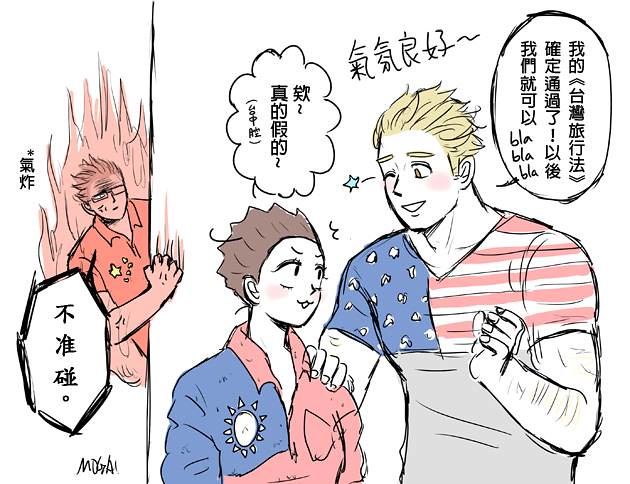 |
| The Guy (from here - I've talked to them about permission to post their work generally - they are great and you should check them out) |
The rejection of Chiang’s memory reflects an undeniable reality: the old assumption that both Taiwan and China long to unite as one nation-state but disagree on which regime has legitimacy is simply not accurate any- more. Beijing’s failure to uphold the promise of autonomy in Hong Kong and Macau only makes unification with Taiwan even more far-fetched. For Americans in this day and age to still defend Kissinger’s “One China” policy—a shameful, self-serving lie to please the Chinese—is to pretend otherwise; the passive strategy aims to do the bare minimum to maintain the status quo, a status quo that is inherently unjust.
If you take one thing away from my quote-fest here, liberals, let it be that. And this:
It is high time for the political left to rethink taiwan. Progressives’ silence—whether because they are oblivious to the island’s changing politi- cal landscape or disinclined to anger Beijing—does a grave disservice to the taiwanese people who have come such a long way.
I SCREAM THIS AT PEOPLE IN MY DREAMS.
But where the island struggles most has always been on the world stage. When the SARS epidemic was killing hundreds of victims in neigh- boring Hong Kong and China back in 2003, Taiwanese epidemiologists had to combat the disease alone after the WHO denied them access to samples and information. Few things have changed over the years. the International Olympic Committee returned a verdict this May that forced Team Taiwan to keep playing under the awkward “Chinese Taipei” designation in the forth- coming Tokyo 2020 Games. Even with the deck stacked against it, however, Taiwan has not stopped fighting for respect and recognition.
The island merits them; it has never exploited its diplomatic alienation to act out. Rather, it has proven time and again to be a responsible, if minor, power. At a time when many Western countries are turning inward, Tsai has called immigrants “an infusion of new strength and a force for cultural diversity.”
Well, I'd like to see all those nice words on immigration translate into a shot at dual nationality without having to fit into some Special Magic Foreigner box, but cool. Some laws have been relaxed, and I appreciate that. I think she means what she says, and I think the generally pan-green or anti-KMT/pro-Taiwan side finally believes this while fighting conservatives in their ranks.
In any case, when it comes to Taiwan, this is dead on. Taiwan has done nothing to make waves - if anything, it accepts more humiliation than it ought to (it shouldn't have to accept any) to keep the peace. It has been nothing but stable and calm in the face of an increasingly screamy, angry, irrational China.
And yet, Taiwan is painted as the bad guy - raising "tensions", full of "hardliners", who need to make "concessions" because what China thinks about Taiwan is apparently more important than what Taiwan thinks about itself.
Let's bring it home with a hit right to the liberal sweet spot:
If the American left is serious about opposing a reactionary foreign pol- icy that preserves unequal power relations, it should speak up for Taiwan. Its enlightened views on gender, ethnicity, and class have translated into a social structure that’s reminiscent, in certain ways, of Northern Europe’s. Its capability and readiness to tackle the greatest challenges of our time, from terrorism to climate change, make it a well-deserved member of the international community. Its unlikely historical trajectory shows that bringing genuine progress to a part of the world where individual liberties are more often threatened than cherished is possible.
OH YEAH.
Subscribe to:
Posts (Atom)

